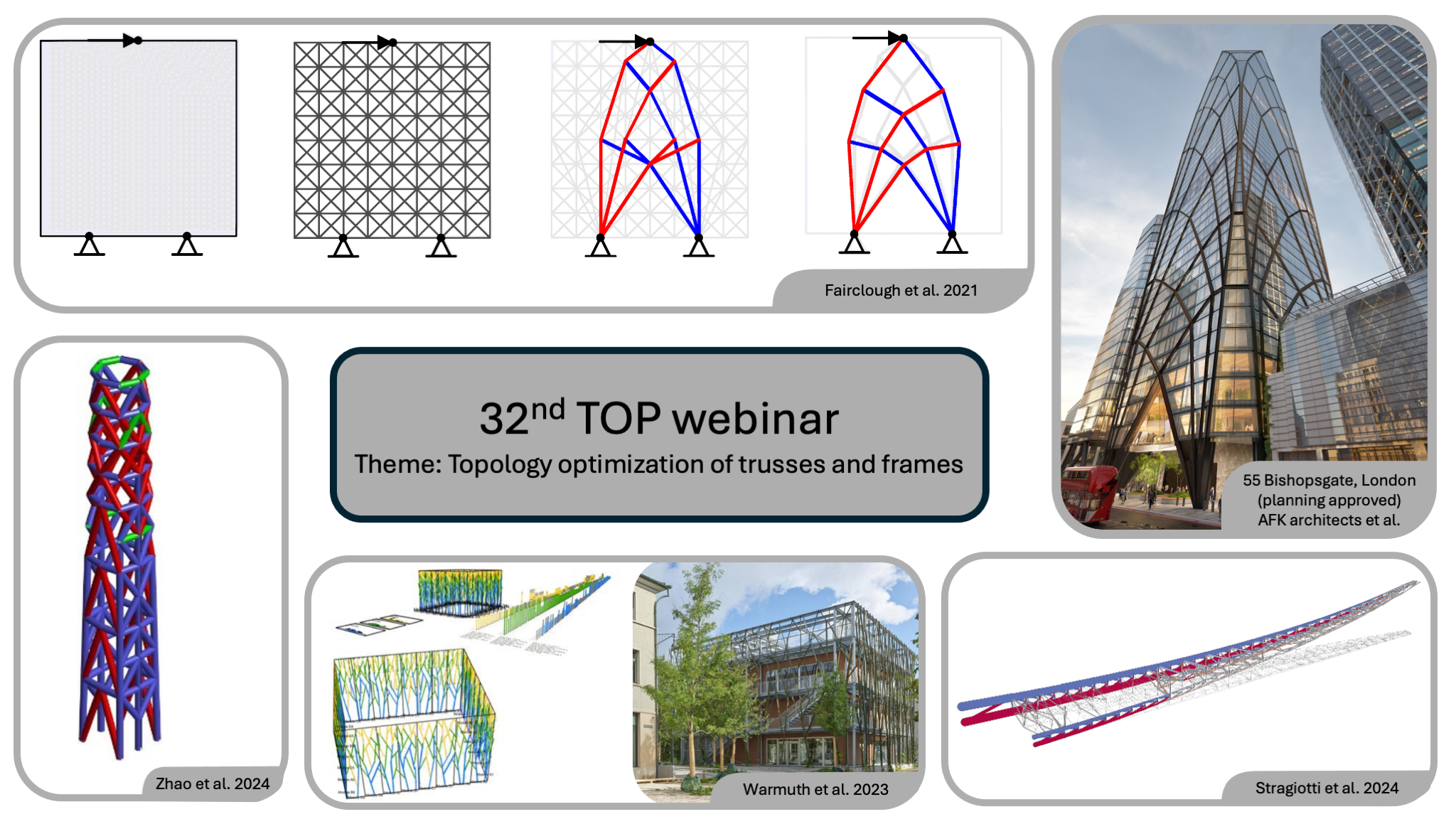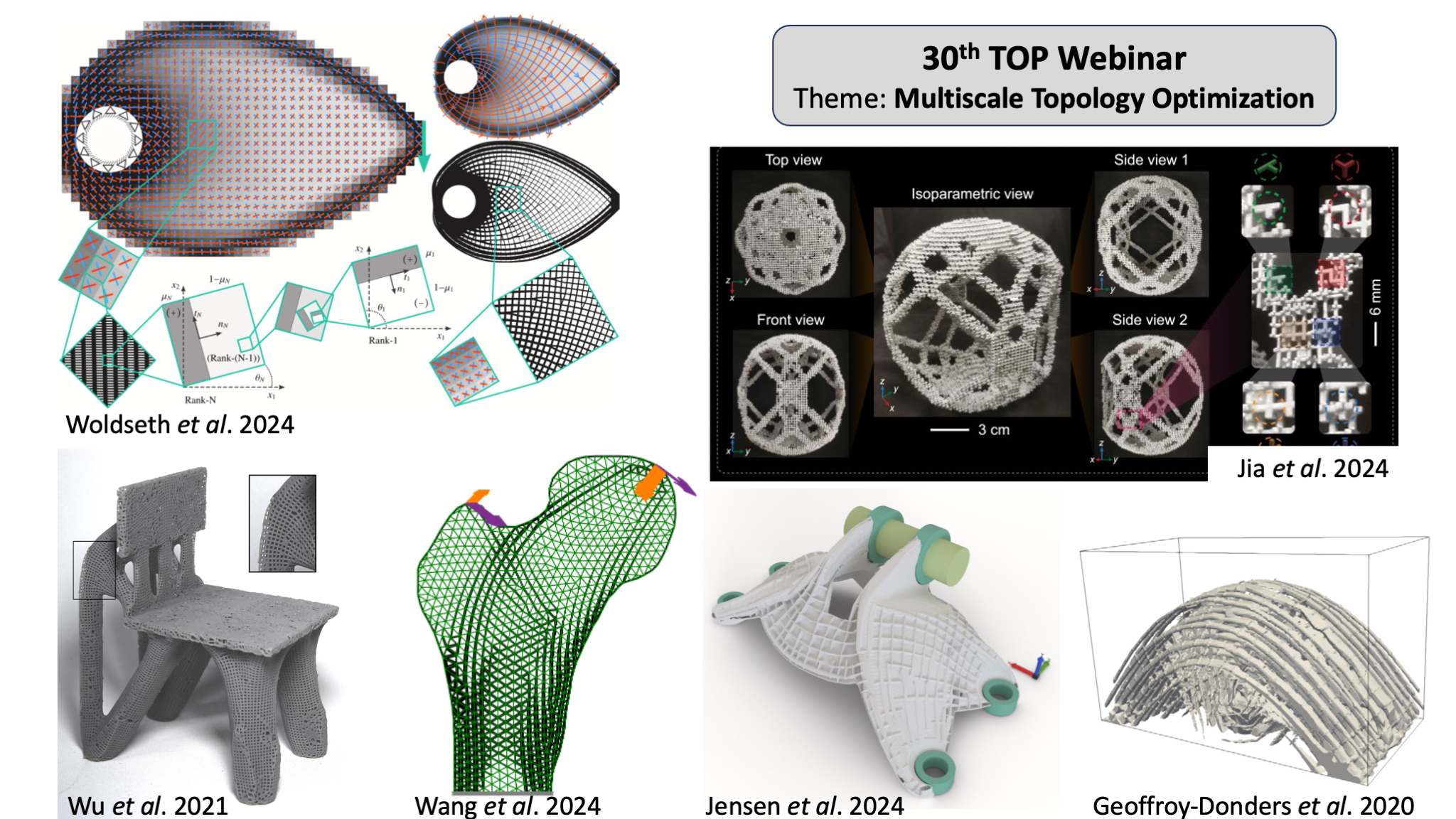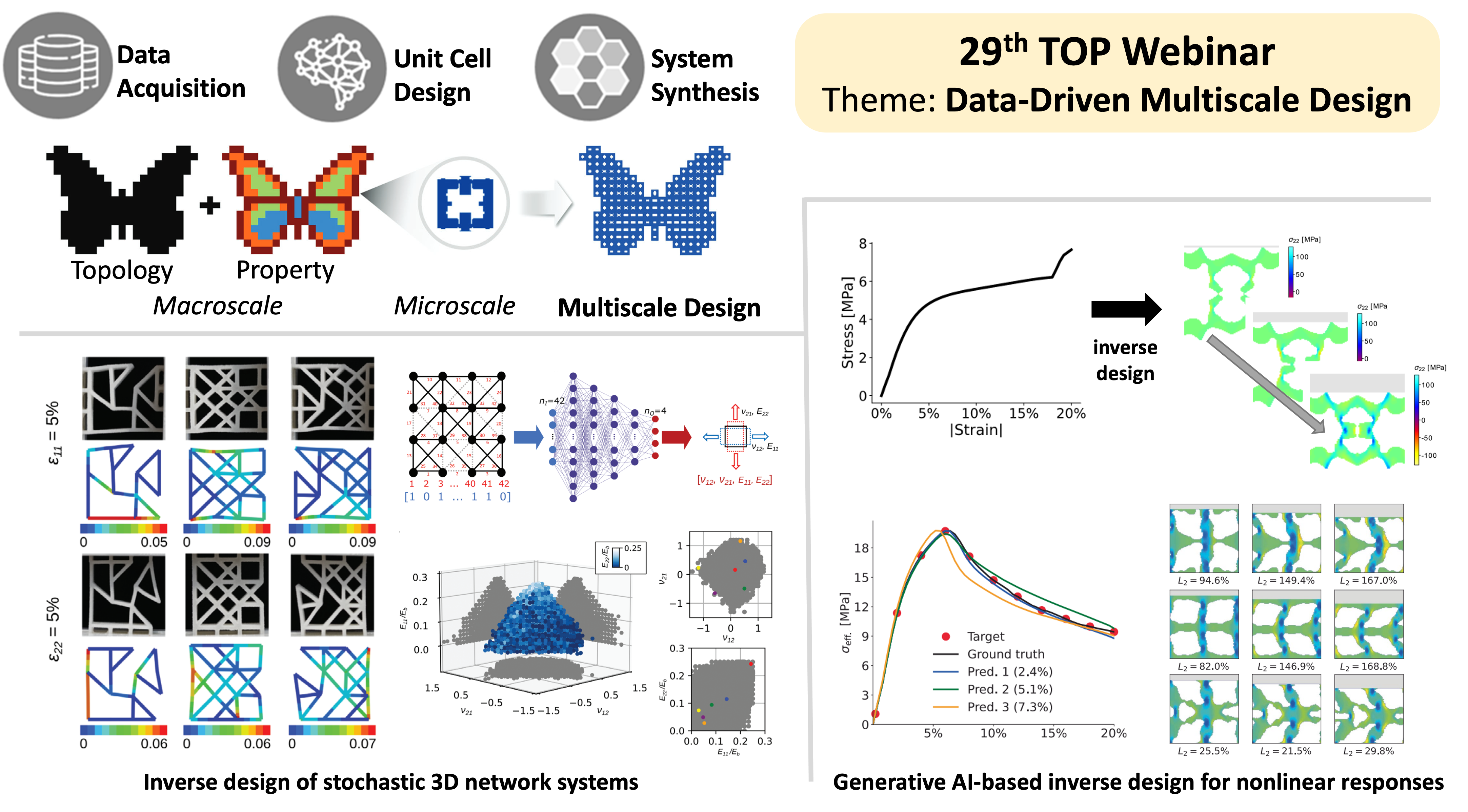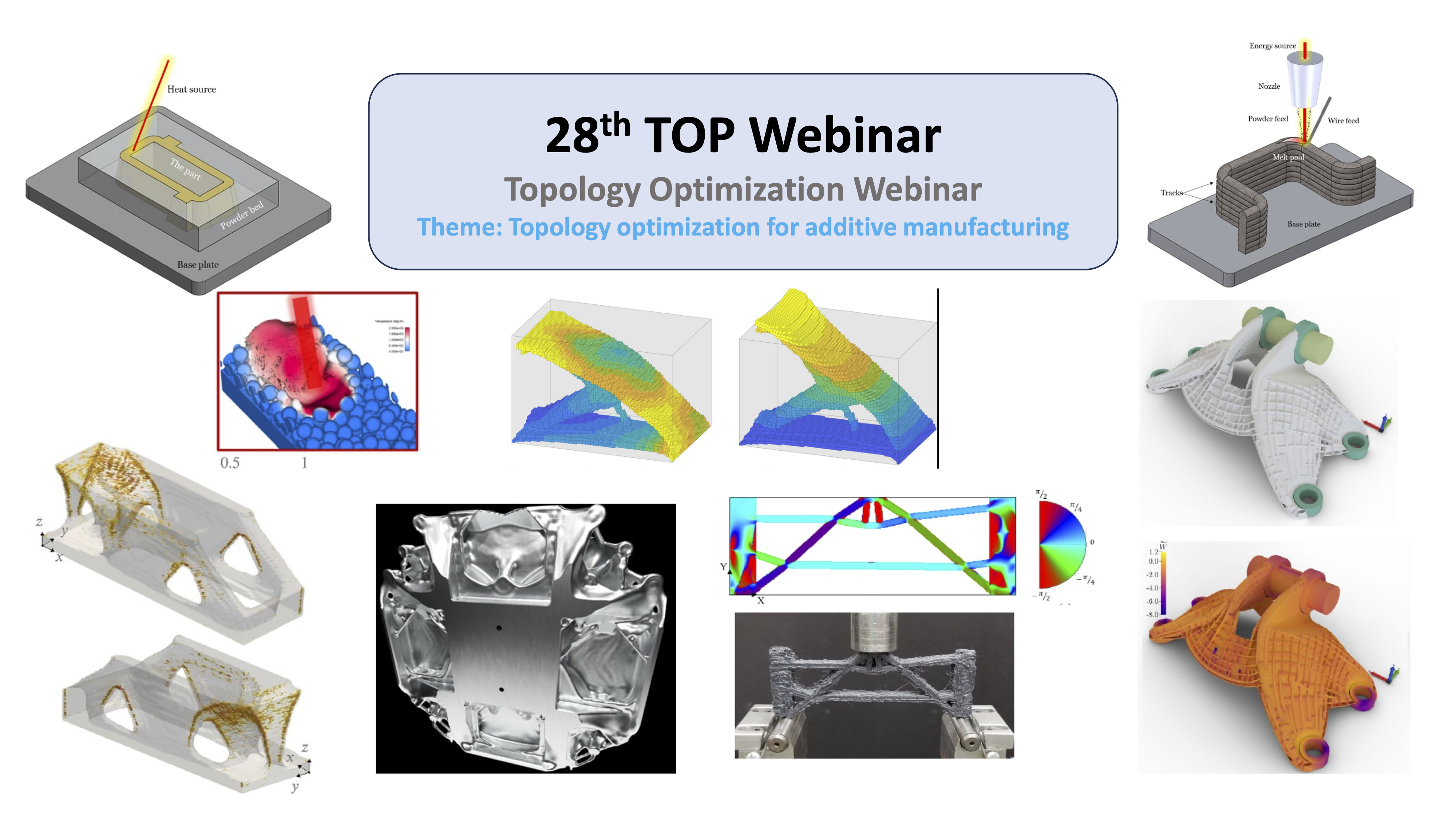We are pleased to announce the program of the 33rd TOP Webinar, a thematic session on “Topology Optimization in Industry”. It is scheduled for the 24th of October 2024, 16:00-17:00 CEST (UTC+2) Time zone converter.
Please register at this link. This event will also be live-streamed on YouTube with this permanent link.
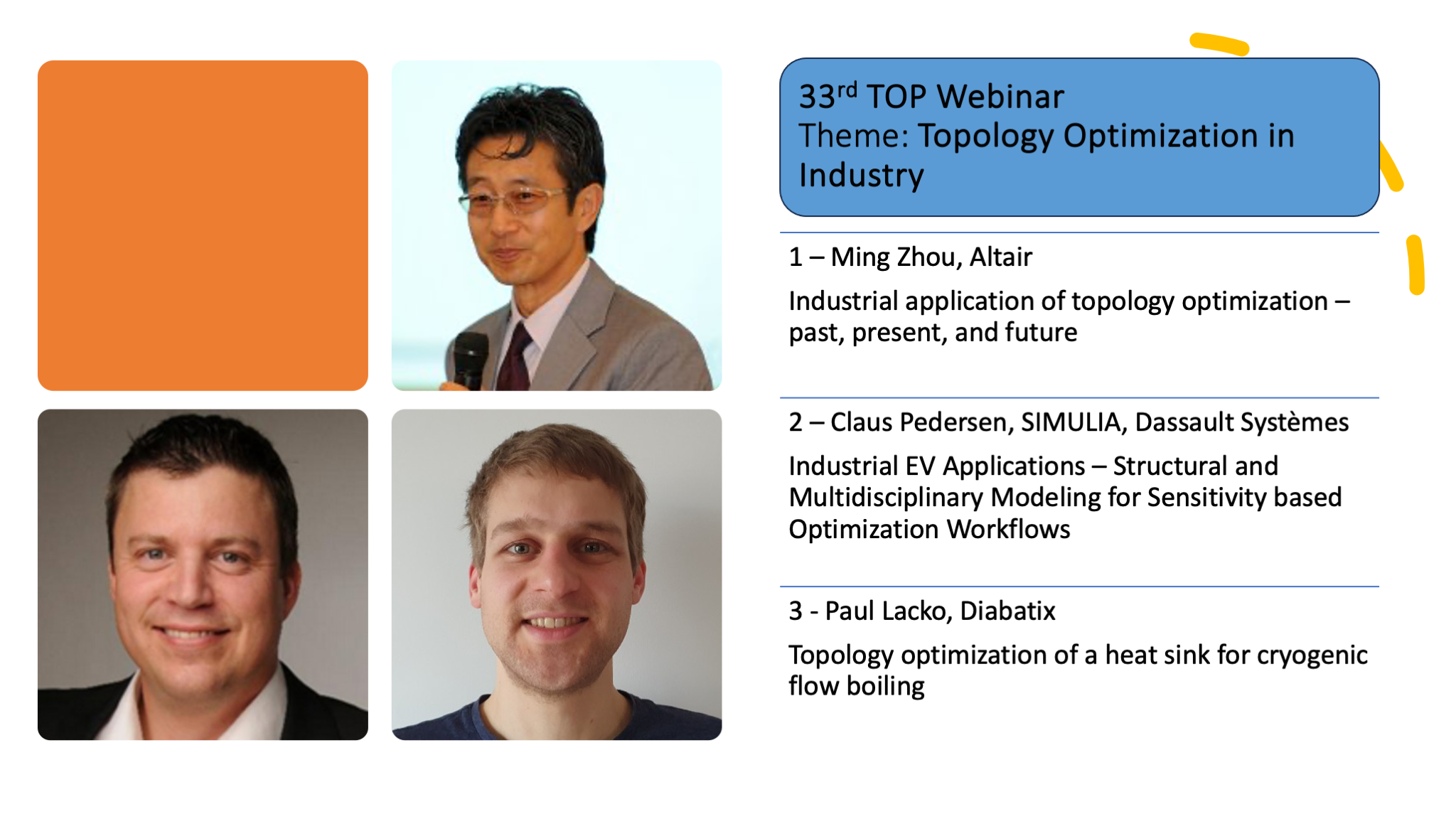 Hosts: Jun Wu (TU Delft), Niels Aage (DTU Denmark), Matthijs Langelaar (TU Delft)
Hosts: Jun Wu (TU Delft), Niels Aage (DTU Denmark), Matthijs Langelaar (TU Delft)
Speakers:
1 – Ming Zhou (Altair)
Industrial application of topology optimization – past, present, and future
Abstract: Industry adoption of topology optimization accelerated approximately two decades ago, when Airbus and Boeing incorporated it for their respective new airliner programs Boeing 787 and Airbus 380 and 350. About 10 years ago, the technology gained broader visibility with the rise of additive manufacturing, as its generative design narrative captured widespread attention. This talk aims to (1) review the technology’s evolution; (2) assess its current status and associated challenges; (3) offer insights into what the next generation of technology could look like, along with its impact on product engineering.
2 – Claus Pedersen (SIMULIA, Dassault Systèmes)
Industrial EV Applications – Structural and Multidisciplinary Modeling for Sensitivity based Optimization Workflows
Abstract: Due to sustainability, the Transport and Mobility (T&M) sector has started a transformation from conventional Fossil based systems to Electric Vehicles (EVs). Thus, we suggest applying CAE workflows including structural and multidisciplinary modeling and non-parametric optimization approaches based upon adjoint sensitivities for addressing the challenges for deriving new and improved designs.
Initial, we address classic structural modeling and topology optimization for lightweight, stiffness, strength and dynamic properties. Additionally, we apply a fatigue reserve factor for infinite fatigue life optimization including multiaxial and non-proportional loading of wheel system components. Furthermore, a geometrically nonlinear quasi-static analysis and a new stabilization scheme for the void elements are applied for buckling optimization of the components. Afterwards, we apply multiphysics modeling for optimizing the low frequency and high frequency electrical applications of EVs as the electrical machine performance and antenna performance. To conclude, the applied applications will also address End-to-End optimization workflow including automated CAD-reconstruction as well as optimization of numerous CAD parameters using intermediate field representations based upon semi‐analytical gradient‐based optimization of exact CAD models.
3 – Paul Lacko (Diabatix)
Topology optimization of a heat sink for cryogenic flow boiling
Abstract: Novel heat transfer solutions are highly sought after across industries facing thermal management challenges. Topology optimization plays a pivotal role in pushing the boundaries of performance in these applications. At Diabatix, we leverage this technology to deliver manufacturable cooling solutions to our clients. In this presentation, we will discuss a case study of a topology-optimized liquid nitrogen CPU cooler designed to operate at -196°C. Experimental analysis demonstrates that this heat sink significantly outperforms its conventional counterpart.
Biographies
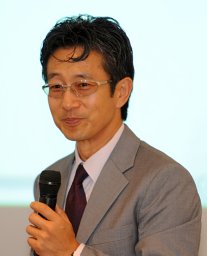 Dr. Ming Zhou is currently the Chief Engineer at Altair, where he leads the development of computational mechanics and design optimization solutions. Since joining Altair in 1998, he has served as the chief architect for the company’s optimization technology. OptiStruct, one of Altair’s flagship products, is widely recognized for pioneering topology optimization across a range of industrial applications. Notably, OptiStruct contributed to a 40% weight reduction in the wing leading-edge ribs of the Airbus A380 through topology optimization. It has also played a crucial role in the lightweighting of the Boeing 787 and Airbus A350. These successes extend across major industries, including aerospace, automotive, rail, heavy industry, electronics, consumer goods, and architectural design.
Dr. Ming Zhou is currently the Chief Engineer at Altair, where he leads the development of computational mechanics and design optimization solutions. Since joining Altair in 1998, he has served as the chief architect for the company’s optimization technology. OptiStruct, one of Altair’s flagship products, is widely recognized for pioneering topology optimization across a range of industrial applications. Notably, OptiStruct contributed to a 40% weight reduction in the wing leading-edge ribs of the Airbus A380 through topology optimization. It has also played a crucial role in the lightweighting of the Boeing 787 and Airbus A350. These successes extend across major industries, including aerospace, automotive, rail, heavy industry, electronics, consumer goods, and architectural design.
Dr. Zhou has been an active member of the structural and multidisciplinary optimization (SMO) research community. Since 2020, he has been serving as the Editor-in-Chief of the journal Structural and Multidisciplinary Optimization and was the Vice President of the International Society of Structural and Multidisciplinary Optimization (ISSMO) from 2019 to 2023. He has published over 100 research papers in journals and at conferences, garnering over 6,500 citations. Notably, he was among the original authors of the SIMP method for topology optimization.
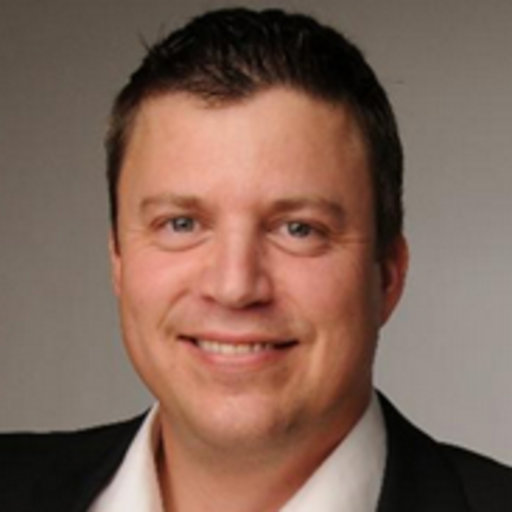 Dr. Claus Pedersen is Optimization Technology Director for the Multiphysics/Multidiscipline domain of R&D SIMULIA, Dassault Systèmes where he has the job role of defining R&D strategies, inventing and examining the technology of new optimization methodologies, coding of CAE and optimization kernels, technical due diligence, coaching and knowledge sharing for core optimization technologies, research projects and numerical implementations, worldwide presale for customers and presenting at conferences, and corporations with leading international universities. Additionally, his role is highly interdisciplinary working with different teams and organizations involving crossover brand activities from R&D, marketing to international sales on latest technologies.
Dr. Claus Pedersen is Optimization Technology Director for the Multiphysics/Multidiscipline domain of R&D SIMULIA, Dassault Systèmes where he has the job role of defining R&D strategies, inventing and examining the technology of new optimization methodologies, coding of CAE and optimization kernels, technical due diligence, coaching and knowledge sharing for core optimization technologies, research projects and numerical implementations, worldwide presale for customers and presenting at conferences, and corporations with leading international universities. Additionally, his role is highly interdisciplinary working with different teams and organizations involving crossover brand activities from R&D, marketing to international sales on latest technologies.
He has continued to have a strong connection to applied science and research since he received his Ph.D. at Department of Mechanical Engineering, Solid Mechanics, Technical University of Denmark in 2002 and his work the following 2 years as Research Associate at Department of Engineering, Cambridge University, UK. He is reviewing for thirteen international journals, external examiner at several technical universities and supervisor of interns. He has published 24 articles in reviewed international journals and held many presentations at international conferences.
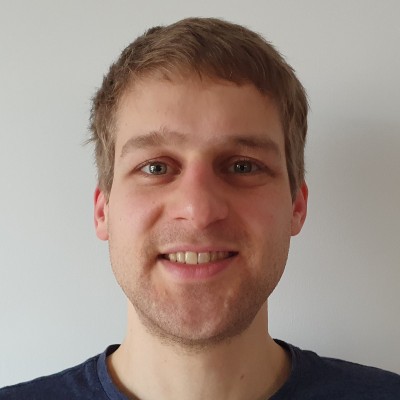 Dr. Paul Lacko is a mechanical engineer and works as a Senior R&D Engineer at Diabatix. He joined the company in 2021 after completing his PhD at KU Leuven. His research focused on enhancing the manufacturability of topology-optimized micro heat sink designs using filtering and homogenization-based methods. At Diabatix, Dr. Lacko contributes to the development of the company’s flagship product, ColdStream, a generative design platform that helps engineers optimize thermal performance. Diabatix collaborates worldwide with leading customers across diverse industries such as automotive, LED lighting, and semiconductor manufacturing, positioning itself as a pioneer in advanced thermal management solutions.
Dr. Paul Lacko is a mechanical engineer and works as a Senior R&D Engineer at Diabatix. He joined the company in 2021 after completing his PhD at KU Leuven. His research focused on enhancing the manufacturability of topology-optimized micro heat sink designs using filtering and homogenization-based methods. At Diabatix, Dr. Lacko contributes to the development of the company’s flagship product, ColdStream, a generative design platform that helps engineers optimize thermal performance. Diabatix collaborates worldwide with leading customers across diverse industries such as automotive, LED lighting, and semiconductor manufacturing, positioning itself as a pioneer in advanced thermal management solutions.

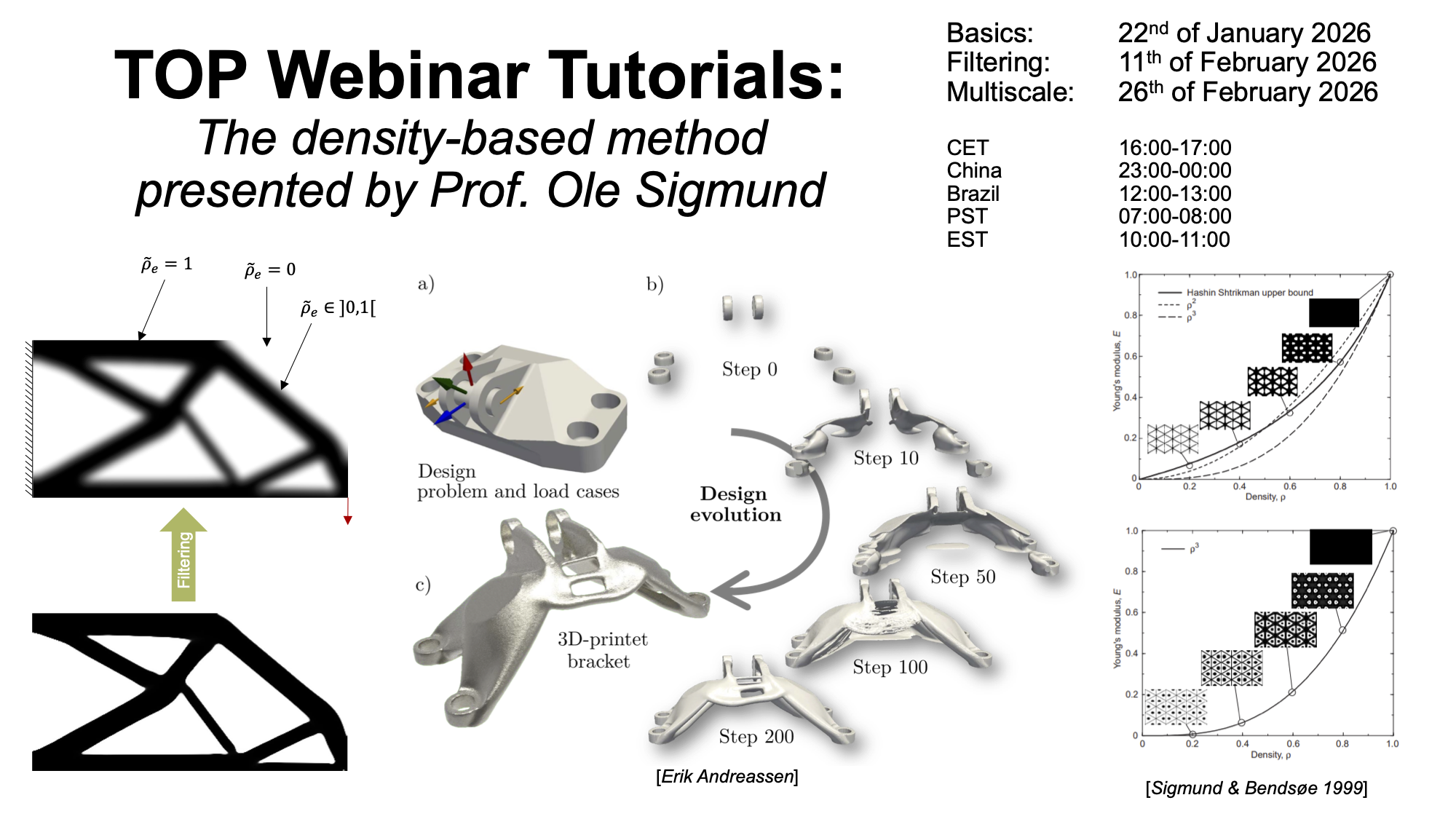
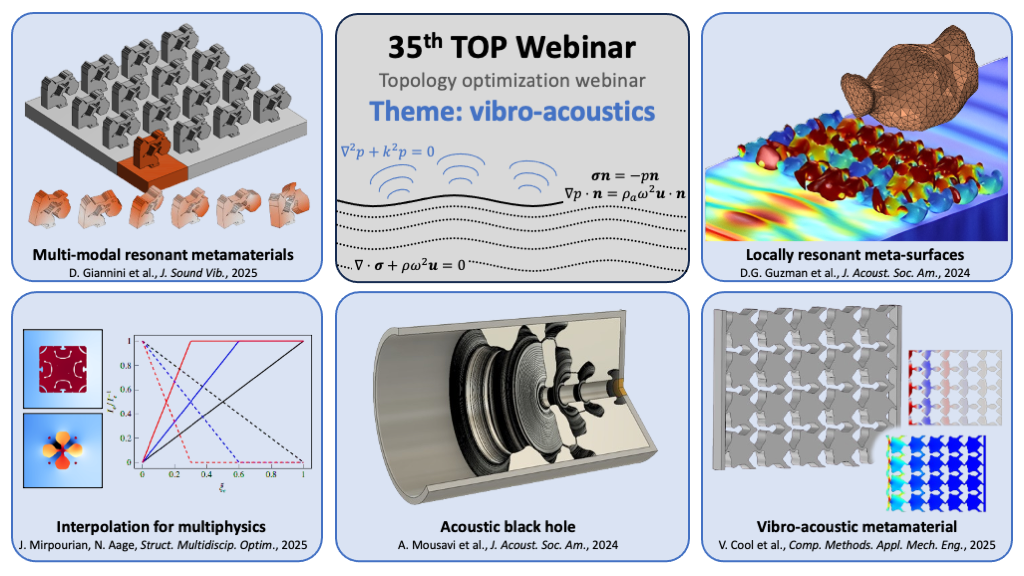
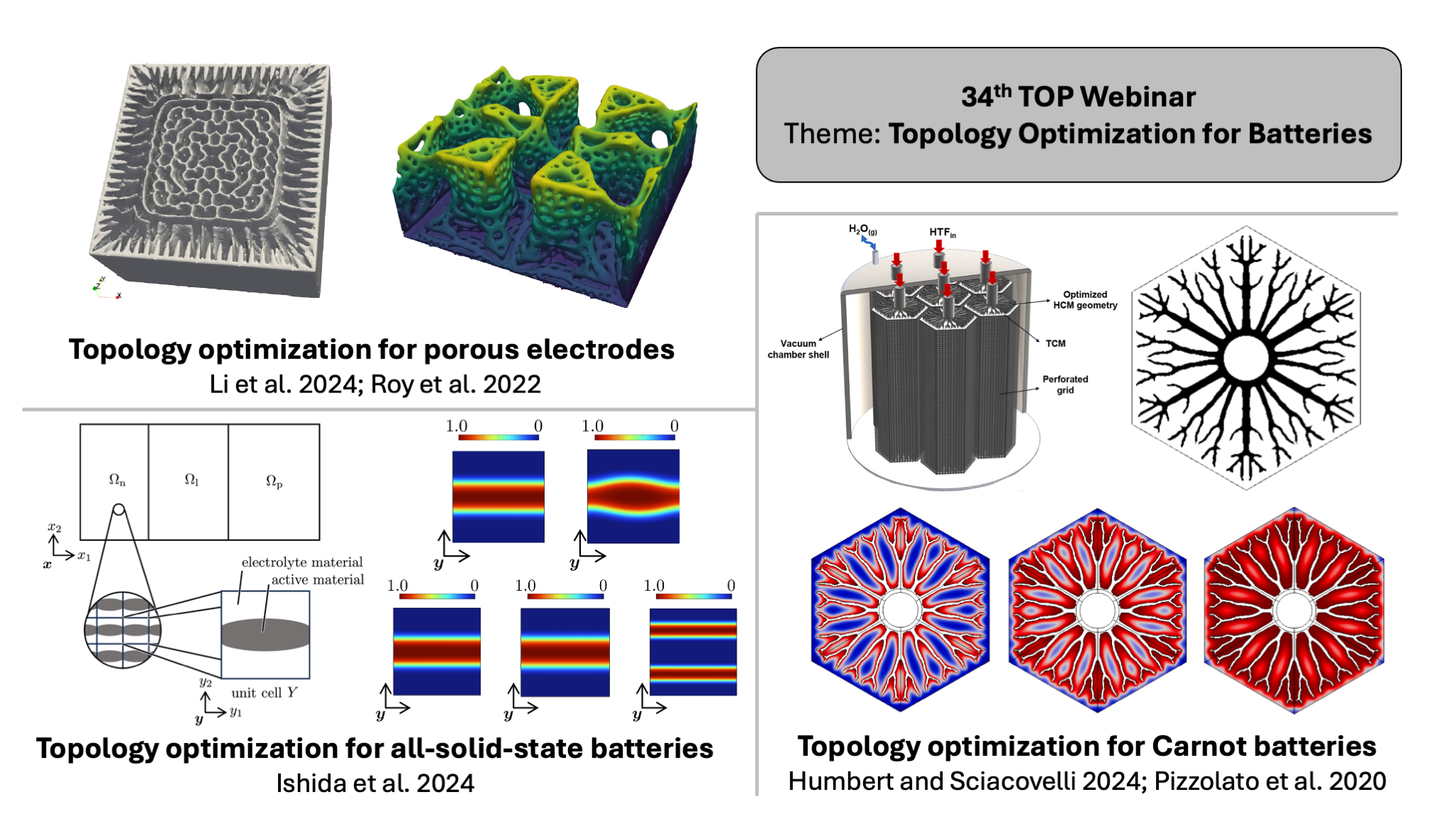
 Hosts: Jun Wu (TU Delft), Niels Aage (DTU Denmark), Matthijs Langelaar (TU Delft)
Hosts: Jun Wu (TU Delft), Niels Aage (DTU Denmark), Matthijs Langelaar (TU Delft) Dr. Ming Zhou is currently the Chief Engineer at Altair, where he leads the development of computational mechanics and design optimization solutions. Since joining Altair in 1998, he has served as the chief architect for the company’s optimization technology. OptiStruct, one of Altair’s flagship products, is widely recognized for pioneering topology optimization across a range of industrial applications. Notably, OptiStruct contributed to a 40% weight reduction in the wing leading-edge ribs of the Airbus A380 through topology optimization. It has also played a crucial role in the lightweighting of the Boeing 787 and Airbus A350. These successes extend across major industries, including aerospace, automotive, rail, heavy industry, electronics, consumer goods, and architectural design.
Dr. Ming Zhou is currently the Chief Engineer at Altair, where he leads the development of computational mechanics and design optimization solutions. Since joining Altair in 1998, he has served as the chief architect for the company’s optimization technology. OptiStruct, one of Altair’s flagship products, is widely recognized for pioneering topology optimization across a range of industrial applications. Notably, OptiStruct contributed to a 40% weight reduction in the wing leading-edge ribs of the Airbus A380 through topology optimization. It has also played a crucial role in the lightweighting of the Boeing 787 and Airbus A350. These successes extend across major industries, including aerospace, automotive, rail, heavy industry, electronics, consumer goods, and architectural design. Dr. Claus Pedersen is Optimization Technology Director for the Multiphysics/Multidiscipline domain of R&D SIMULIA, Dassault Systèmes where he has the job role of defining R&D strategies, inventing and examining the technology of new optimization methodologies, coding of CAE and optimization kernels, technical due diligence, coaching and knowledge sharing for core optimization technologies, research projects and numerical implementations, worldwide presale for customers and presenting at conferences, and corporations with leading international universities. Additionally, his role is highly interdisciplinary working with different teams and organizations involving crossover brand activities from R&D, marketing to international sales on latest technologies.
Dr. Claus Pedersen is Optimization Technology Director for the Multiphysics/Multidiscipline domain of R&D SIMULIA, Dassault Systèmes where he has the job role of defining R&D strategies, inventing and examining the technology of new optimization methodologies, coding of CAE and optimization kernels, technical due diligence, coaching and knowledge sharing for core optimization technologies, research projects and numerical implementations, worldwide presale for customers and presenting at conferences, and corporations with leading international universities. Additionally, his role is highly interdisciplinary working with different teams and organizations involving crossover brand activities from R&D, marketing to international sales on latest technologies. Dr. Paul Lacko is a mechanical engineer and works as a Senior R&D Engineer at Diabatix. He joined the company in 2021 after completing his PhD at KU Leuven. His research focused on enhancing the manufacturability of topology-optimized micro heat sink designs using filtering and homogenization-based methods. At Diabatix, Dr. Lacko contributes to the development of the company’s flagship product, ColdStream, a generative design platform that helps engineers optimize thermal performance. Diabatix collaborates worldwide with leading customers across diverse industries such as automotive, LED lighting, and semiconductor manufacturing, positioning itself as a pioneer in advanced thermal management solutions.
Dr. Paul Lacko is a mechanical engineer and works as a Senior R&D Engineer at Diabatix. He joined the company in 2021 after completing his PhD at KU Leuven. His research focused on enhancing the manufacturability of topology-optimized micro heat sink designs using filtering and homogenization-based methods. At Diabatix, Dr. Lacko contributes to the development of the company’s flagship product, ColdStream, a generative design platform that helps engineers optimize thermal performance. Diabatix collaborates worldwide with leading customers across diverse industries such as automotive, LED lighting, and semiconductor manufacturing, positioning itself as a pioneer in advanced thermal management solutions.